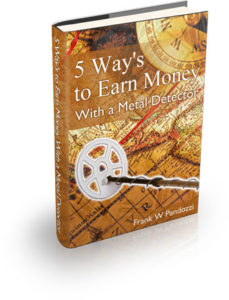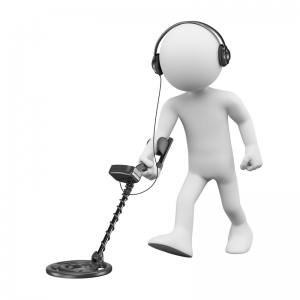
One of the first questions someone asks when thinking about taking up the exciting endeavor of Metal Detecting is; ‘What’s the best metal detector to get?’ I asked it myself. My kids actually were the ones that ended up getting a basic Teknetics for me on Mother’s Day a couple years back. It was enough to get me started and get me hooked on metal detecting. It’s such a thrill to find ‘lost treasures’! (of any type)
But I am now wondering should I get something different and have asked again, “What type of Metal Detector should I get?” I’m sure many others wonder this as well. Because of this, I asked six different experienced detectorists that question. Below are their truly informative and helpful answers. Thank you!
Enjoy! And I’m sure the following answers will help you to decide whether picking up the adventurous fun of metal detecting is for you or not, and will help guide you to your first metal detector decision.
- 1) H.Charles Beil is an Historical Archaeologist. He received a Bachelor Degree in History from Duquesne University in 1982; studied historical geology, archeology and oceanography under Skinner and other world renowned geologists, archeologists and scientists, and has been an avid treasure hunter for nearly 50 years.He’s published numerous articles on the subjects of treasure hunting, metal detecting and ghost towns and has been a frequent researcher in the tiny historical societies, large libraries and museums all along the Eastern Seaboard and the Mid-Atlantic States. More than an historian, his finds are in museums and personal collections throughout the country.He is a larger than life “Indiana Jones”. Along with certificates in archaeology from the U.S. Dept. of the Interior, Brown University, Emory University and Tel Aviv University, H.Charles is an avid SCUBA diver and expedition planner; having traveled the Continental U.S. rediscovering lost towns, mines and missions in search of relics, gems and precious metals.He also owns the website TreasureIllustrated.com, one of the larger metal detecting forums on the Internet along with its associated social media which have garnered in excess of 3 million hits per month.
What is the best metal detector to get and why?
There’s an array of great companies that produce metal detectors today and all of them have quality units for sale. However, the purchase of a metal detector is not one that should be taken lightly or bought on a whim since these machines range from about sixty dollars to many thousands of dollars and you’ll want to make sure that you’re buying one that will suit your needs and the type of metal detecting that you intend to do. Before I look at new detectors I determine what my needs are; am I going to be primarily coin shooting, relic hunting, nugget shooting, treasure hunting for deeper targets or hunting in fresh or salt water with the new machine. Your intended use is going to determine which detectors you should be looking at. Other determining factors will be your level of experience, age and how often you plan to detect.
I wouldn’t recommend to my friends to buy the underwater detector that I use (Fisher Pulse 8x at $2,500) if they were only going to wreck dive once a year or to buy a high end gold prospecting detector for $3,500 if they were only nugget shooting over occasional vacations in the American southwest. I don’t get caught up in the hype of a particular brand, I like to see a return on my investment and quite honestly you’ll have available an assortment of mid-range priced detectors that will do a great job for the average metal detectorist without taking out a second mortgage.
In this business, high price doesn’t necessarily translate to better. Some high end detectors offer features that sound absolutely tremendous and you might be sold on a particular feature that you’ll never learn to use because they are geared toward professionals who are in the field at least weekly if not daily. I find that a good mid-priced detector is generally the right solution for somebody who is just getting started in metal detecting but plans to go out at least once a month as weather permits.
I’ve hunted with a lot of people over the years and I’ve found that most guys don’t want to be bothered with running assorted programs on their detectors; they want a detector that they can turn on, ground balance and go! They want a detector that does a good job on coins, jewelry and relics all rolled into one machine. They want to be able to hunt parks, playgrounds, old cellar holes and beaches all with the same detector.
I think that Garrett Metal Detectors hit a home run with their AT-Pro. It’s a mid-range detector costing about $550 that pretty much does it all. It’s VDI display is easily learned so that you can identify your target pretty well even before you dig. The biggest advantage of the AT-Pro is that it’s waterproof to 10 feet deep, allowing the detectorist to hunt shallow water that heretofore was inaccessible to them. This feature alone really catapulted Garrett to the forefront of the metal detector manufacturing industry with the avid metal detecting hobbyist.
Fisher Research Labs also makes excellent equipment and depending upon the intended use I prefer some of their models over Garrett’s. For gold prospecting and nugget shooting I don’t think that you can do any better than the Gold Bug II at about $750. This machine is so sensitive that I’ve had it pick up residual rust left in a hole by a nail, staples and small pickers (Nuggets) the size of the head of a pin.
For terrestrial detecting Fisher has a large assortment spanning several brands; Fisher, Tesoro, Teknetics and Bounty Hunter and they are the oldest company in the business and they recently came out with a waterproof detector to rival the AT-Pro.
If you have a youngster that is interested in getting started in metal detecting and you don’t want to break the bank, you can’t go wrong with the Garrett ACE 250. It’s a detector that is easy to use right out of the box, discriminates well and ground balances easily all for about $200 and it’s one that they won’t outgrow too soon.
Another factor that I like to keep in mind before I make my purchase is what will I do if my detector needs to be repaired? Having dealt with both of these companies for many years along with several others I can say that I’ve never been disappointed with their service or their warranties. They have always exceeded my expectations.
I like to read the ground test results on detectors that I’m interested in and to try one out before I buy it to see how it feels and handles in the field. Is it balanced, light weight, adjustable and durable? How’s the backlighting look on the display? What types of coils are available for the machine?
So whether you’ve been detecting for a while and are ready to upgrade or you’re new to the hobby either of these companies are able to provide the quality equipment that you’ll need at the price point that you can afford. That’s why I use them.
- 2) Mark Orwig has been metal detecting for over 10 years. He currently hunts with the Minelab CTX 3030 and is most interested in old coins and colonial relics. Mark is the managing editor at Smarterhobby.com.
If you’re trying to figure out what’s the best metal detector, let me save you some time. There isn’t a ‘best’ metal detector. The question needs to be what is the best detector for the type of hunting you want to do, your location, your experience, your budget and even if you plan to use it on your summer beach vacation.
The big brands don’t make ‘inferior’ detectors. They all have similar lineups of machines to fit into each of these target markets. So is the Garrett AT Pro better than the ACE 200? Maybe…it depends on the person buying it.
The best advice I can give is to get yourself a good entry-level detector to learn the basics. Over time you can upgrade if your budget increases or if you want to do more specialized detecting like salt water beach hunting.
And remember the golden rule with metal detecting – a detector is only as good as the detectorist!

- 3)Frank W. Pandozzi has been metal detecting and treasure hunting for more than 40 years. He is an author, and a speaker. Frank was the Executive Producer and host of Exploring History’s Treasures TV series.This TV series was the first reality, metal detecting, TV show.
Metal Detecting Ghost Towns of the East
The Best Metal Detector Does Not Have To Be Expensive By F.W. Pandozzi
“My detector is better than your detector.”
“My detector goes deeper.”
“My detector has more software built into it.”
And the arguments go on and on. Every popular metal detecting forum has people commenting, even arguing over which detector manufacturer has the best model. I’ve also been in the field metal detecting with others when the arguments start. It’s nonsense. Actually, it’s childish.
The reality is this; the best detector is any good, reputable model that finds stuff. Ya, it really is that simple. And, it does not have to be an expensive metal detector either.
I’ve been metal detecting and treasure hunting for more than forty years, I’ve used many metal detectors on the market, and, I’ve learned that all of them locate stuff.
Sometimes too much information is not a good thing. The more you read and hear from others regarding what is the best metal detector to buy, you become confused. Most often what happens is that you end up buying the most expensive detector thinking that if it costs a lot of money then it must be good. And if you’re thinking this way, beware, because you may end up tossing your detector in the closet never to be seen again. Remember this:
It’s is not the detector that locates the goodies, it’s the skill of the user. The person who knows his or her detector, and understands how it performs, will always find stuff.
Give an expensive metal detector to someone who has no idea how to get the best performance form that detector, and they will find very few keepers. However, give an inexpensive detector to a person who is knowledgeable on how that particular detector operates, and that person will out perform the other every time.
If you learn how to properly use your metal detector, and you use it often, the amount of good finds will increase. Don’t get caught up in the arguments about depth, and all of the bells and whistles many new detectors have. You don’t need to dig to China to locate goodies, and you don’t need a computer that can launch a Titan Missile with its software.
Learn your detector, use it often, and you will do as well as anyone with a top end model.
The best metal detector can be an inexpensive model, if you know how to use it correctly.
- 4)Harry has a YouTube channel called “iDetect”. Here he shares his metal detecting adventures, and has been metal detecting for two years, every weekend. He currently uses a Garrett AT pro metal detector.
The metal detector I started with and would recommend to anyone wanting to start metal detecting is a Garrett ace 250.
It is a fantastic machine, simple to use with great performance, and best of all, it doesn’t cost a fortune.
- 5) John has been metal detecting for about 8 years,and shares his adventures on @treasureman12 and his Treasureman blog. He has lived in central New York for about the past 11 years, and really enjoys when the weekend comes because he’s up early and ready to get out and detect. He likes the thrill of going to a place and hoping to find an old coin or relic.He also likes the fact that it’s peaceful and quiet, and that he is getting some exercise and feels, ‘what other hobby can you get gas money?’ He likes history, so when he finds an old coin or relic, he says it’s digging up the past. Finding a coin that hasn’t seen sunlight for decades, or a shoe buckle or spoon, something of how people used to live, is exciting.
That’s a tough one to answer. I wish I could give you a definite answer. There are so many metal detector companies with everyone having their own personal preference. White’s, Garrett’s, Minelab, Makro, Fisher, Nokta, Teknetics to name some of the main ones. Each does something just a little bit different than the others. I myself own a Whites, Garrett and Makro and Teknetics detectors.
All my detectors have found me great finds.
My 2 best would be the Whites and Garrett. Good customer service if your machine needs to be fixed, the quality is great, easy to use and not overly expensive depending on what type of machine you are looking for.
I guess the best part is you don’t know what’s in the hole until it’s revealed – just like fishing you don’t know what’s on the line until you reel it in.
- 6) Jim Stone has been detecting along east coast beaches for the past 20 years. He enjoys finding, but never knowing what might get washed up from the waves when he heads out.
I could give advice on about how certain models might have this fancy gadget or has this latest technology, but none of that matters until you know what you are going to use a detector for. For beach hunting, which is what I do, I needed a detector which was specifically designed to not throw false signals from wet sands. But if you aren’t going to be detecting the beach along the water line, then you don’t need that.
So first ask, “What do I want to detect?” If you don’t know this, then I would say any relatively inexpensive metal detector that gets you out to begin, and gain experience, is a great detector. From there, you will find your way, and find the best detector for you. It’s one of the finds you discover, so you won’t ever come up empty handed metal detecting.
Thank you all for taking time to answer such an often asked question. I’m sure your generous answers will help guide many into deciding which metal detector is right for them; as a beginner or not.
It helped me greatly, and I can’t thank you enough. I now understand that the best metal detector is one you choose for yourself, and that this is gained from the experience from getting started. The inexpensive Teknetics my kids got me allowed myself to explore Metal Detecting, and to know if this awesome activity is something I want to invest, not only my time, but money in.
I must say, it is! I’ve caught the thrill! If I decide to get another Metal Detector, I can now make the decision from the advice above, and on what is right for me.
I appreciate all of your answers, and would encourage others to check out their websites, YouTube channels, forums, and books.
Best of luck with all that you seek! And always Treasure the Adventure!



Thanks Jenny and the Pros,
What a fun hobby. You have smart kids Jenny:)
I think I do too….:) thanks.
The Teknetics I have doesn’t do well for beach hunting in Wet Sands (fine for dry)….so I’m so thankful for the above advice and will be looking for a detector for specifically that type of beach detecting– which I love to do. But I love all types…..
Do you metal detect, Strawshadow?
Yes I do Jenny however all my experience has been with gold nuggets. The coins and artifacts I found have been a by product from that. I was very fortunate many years ago, my first target was a gold nugget. Some day, under the right circumstances, I would enjoy a beach detecting trip. There are always new detectors on the market, find one that is comfortable for you and learn its personality. You certainly have the right attitude and spirit to be successful, good luck.
Hi Jenny,
Thanks as always for your great blogs.
I have stood at that spot where you are in the photo. Many great memories in that area growing up. Lots of great fishing at the inlet.
Realizing my former career was over for health reasons and falling in love with the chase, I got a metal detector recently. I have not been able to use it quite yet, but look forward to its first outing! I did lots of research before buying. I am not supposed to lift more than 5 pounds so weight of unit was really important.
I got the Garrett AT Pro. Its light, waterproof, and seemed somewhat easy for a total novice like me.
I’ll let you know how I like it after my first treasure hunt with it.
Be well! Good luck detecting 🙂
Yes, please do let us know how you make out, Twingem! Best of luck.
And thank you for your comment and sharing how you chose the ‘right’ detector.
This article asks What’s the best metal detector. I am happy to answer that question ! I own 9 different metal detectors . Literally the best metal detector is the one in your hands. The key to metal detecting is the learning curve ! Learn your detector and what it’s telling you. Use it so often that you know it like the back of your hand as if is an extension of you where it becomes automatic understanding of the sound VDI numbers and the graph bar patterns it creates.
For me, the best metal detector is Minelab GPZ 7000. Hope it will serve your every purpose for detecting. I am not disappointed with it. Thanks for sharing the great article. Happy detecting.